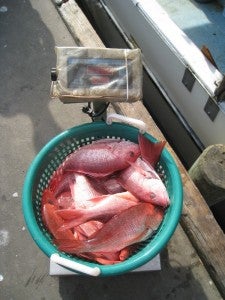I’ll Have the Gulf Red Snapper, Please

[This was originally posted in National Geographic’s Ocean Views Blog]
I’m thrilled to report that Gulf of Mexico red snapper got a little less “red” today. That’s because our partners at the Monterey Bay Aquarium Seafood Watch program – the most well-known sustainable seafood program in the United States – announced that they’ve removed the commercial fishery for Gulf of Mexico red snapper from their ‘Avoid’ list and awarded them a new ‘Good Alternative’ rating.
While there are still improvements to be made in this fishery, let’s take a minute to appreciate how much progress has been made in the last few years. Gulf of Mexico red snapper used to be a poster child for unsafe, wasteful fishing. In the 1980s, 1990s and early 2000s the fishery was ruled by derby seasons where fishermen raced to catch as much fish as possible a few days every month. This had tremendous consequences for both fish and fishermen, as quality and profitability suffered and the red snapper population dwindled.
Fortunately, fishermen, managers and conservationists finally recognized the severity of the problem and decided to get the fishery back on track. In 2007, an Individual Fishing Quota (IFQ) program, coupled with a scientifically set catch limit, was implemented that put Gulf red snapper on the road to recovery. Since then, rebuilding red snapper populations have supported a 70% increase in fishing quotas, waste of marketable fish has declined by about 50%, and fishermen earn 33% more per pound of fish landed. Commercial fishing seasons now last the full year, and the sector demonstrates strong compliance with its catch limit. These same fishermen even pioneered an innovative new traceability program after the Deepwater Horizon disaster that tracks every single fish back to the boat that caught it.
Unfortunately the recreational portion of the fishery (which shares the Gulf red snapper quota about evenly with commercial fishermen) remains saddled with outdated management that leads to blown catch limits year after year. That’s not because recreational fishermen aren’t responsible or don’t care about sustainability. It’s that the recreational management program is utterly failing. The system punishes everyone because it is based on antiquated rules and poor monitoring. To make sure recovery doesn’t backslide, new technologies for faster and better data collection, more accurate fish counting and incentives for conservation are badly needed.
The Gulf of Mexico Fishery Management Council, the body charged with managing the fishery, has many different proposals in front of them to solve the problems facing the recreational fishery. Some of them show promise and some of them could very well make things worse. In the coming months they will be making some important decisions that will impact everyone that depends on the red snapper fishery. The bottom line is that recreational fishermen need a solution that can work for them on the water while providing the necessary incentives and accountability to ensure long-term sustainability for the fishery – so that being on the “red list” will remain a distant memory.
Join me in celebrating the fact that the sustainability stigma is no longer affixed to the Gulf commercial red snapper fishery. Not only does today’s news acknowledge the fishery’s transition to better management; it means that conservation-minded commercial Gulf red snapper fishermen now have access to better market opportunities through major buyers that have made commitments to sustainable seafood. So the next time you see this delicious fish in the market or on a menu, enjoy it with the knowledge that you’re making a good choice for both the ocean and the small family-owned fishing businesses that rely on it.
For more fish musings, please follow me on Twitter @hawaiifitz
Tim Fitzgerald is a marine scientist and senior policy specialist with Environmental Defense Fund’s Oceans Program. Tim directs EDF’s sustainable seafood program, and specializes in the intersection of environmental sustainability and public health. He is also a senior member of EDF’s National Policy team, advocating for more sustainable federal fisheries management policies.










